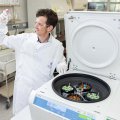A University of Queensland initiative is helping to transform organic waste once considered an expensive headache into the raw material for an emerging multi-million dollar industry.
Giant strides in developing the enormous potential of a neglected asset have been made in the first year of operation of the Recycled Organics Consortium based at the University's Gatton campus.
Consortium operations manager Denise Hart said a focus on research and education was helping to bring a range of projects to commercial reality.
'There are big community benefits to be gained not only from removing a potential waste hazard, but also from improving our marginal soils which are low in carbon,' Ms Hart said.
The Consortium has brought researchers, industry and regulators together for the first time to develop viable solutions for dealing with animal, plant and human waste.
'It has been a steep learning curve, but we are now getting national interest in our work,' Ms Hart said.
A representative board of directors chaired by UQ Gatton's Professor Bruce Young sets the direction for the Consortium which aims to build the use of organic resources to overcome soil degradation and improve agricultural sustainability.
'The return of organic waste to the soil can break the cycle of nutrient mining. But there is a lot of scientific work required to get it right. Just dumping organic material on agricultural land is not the answer,' Ms Hart said.
'There are many significant issues to be considered from health and safety to getting the economics right for new products.'
Ms Hart said a 4-year research program had just begun applying solids extracted at urban waste treatment plants to a range of soil types and growing a variety of different crops.
'This material can be a valuable resource, but there is a real lack of information on use options. Local Government has taken a keen interest in the outcomes of this project.'
'We are also examining the potential for bio-remediation of contaminated sites. Certain plants have the ability to extract contamination from the soil.'
Ms Hart said the work of the Consortium ranged from research into the use of abattoir waste to the development of organic and mulching fertiliser products for the emerging olive growing industry.
The Consortium will hold a major national conference on recycled organics with Environment Australia backing at UQ Gatton from September 25 to 27.
For more information contact Anthony Smith on 07 5460 1229 or at asmith@uqg.uq.edu.au



